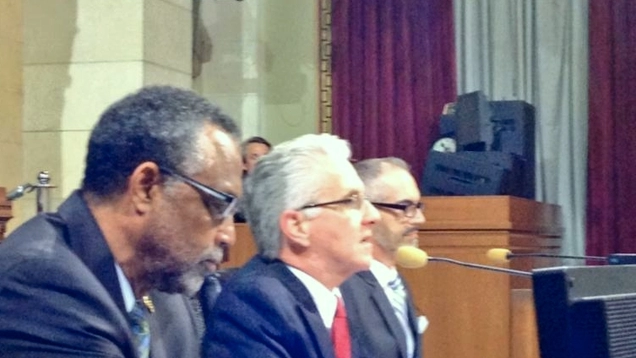
As California continues to compete with other states and countries in the fight for production, entertainment industry workers, local businesses and markets have felt the direct impact of film and television jobs loss. With 44% of the states creative economy workers in L.A., this industry is a pillar of the regions economy. For Los Angeles to remain the entertainment capital of the world, the city and lawmakers need to create a level playing field to compete with other states.In January, I was tapped to lead the Ad Hoc Committee on Film and Television Production Job and have been working to coordinate the citys efforts for a comprehensive look at the film industry in an effort to stem runaway production.
During the Ad Hoc Committees first two meetings, we discussed the effects of runaway production on jobs and the local economy, economic impact of the Californias Film and Television Tax Incentive Program and its expansion. Committee heard testimony from industry workers, and analyses about the direct impact of declining production on local businesses and jobs. According to a recent report by the Milken Institute, California lost more than 16,000 film and television industry jobs from 2004 to 2012 - a 10% decrease - while New York saw its entertainment sector expand by 10,000 jobs, or 25%, as a result of its expansion of film and television tax credit programs. Despite having decades of experience, many workers are now struggling to find work in the industry or moving out of state for months at a time to keep jobs.
This affects more than just entertainment workers, but people working in ancillary industries such as vendors in food services, transportation, floral design, prop houses, and set construction. California currently competes with 40 states and 30 countries for production dollars, (FilmL.A.) For the last decade, this industry has been chipped away by runaway production to other states and other countries with lucrative tax incentives that are designed to specifically target jobs and take the jobs away. Unfortunately as these jobs were slipping away, regrettably, California was asleep at the switch taking for granted that Hollywood would always be here.
In 2009, I worked on legislation in the California State Assembly to curb runaway production, which created the states first successful film and television support package that provided incentives for studios to stay local. Instead of spending millions on their productions and other around-town costs in New Mexico, Canada or Europe, studios now had a reason to spend their millions of dollars in Los Angeles and other Californian cities instead. That, in turn, helped boost other businesses, such as florists, carpenters and small businesses.
A recent analysis of Californias Film and Television Tax Credit Program, by the Los Angeles County Economic Development Corporation to the Ad Hoc Committee, revealed that the states $100 million annual tax program has, in fact, returned $1.11 to local and state governments and increased labor income by $7.15 for every dollar of tax credit that was issued in the first three years of the program. These incentives pay dividends for the economy in jobs and in tax revenues and Sacramento must continue the expansion of this effort.
This industry has guided the citys growth and identified us in the minds of people throughout the world. That is why it is so critically important that we come together and act with great urgency to protect the industry that calls its home Los Angeles.
As we continue to work on policy objectives to make Los Angeles more attractive for production, the Ad Hoc Committee on Film and Television Production Jobs is slated to schedule its third meeting in the coming weeks.